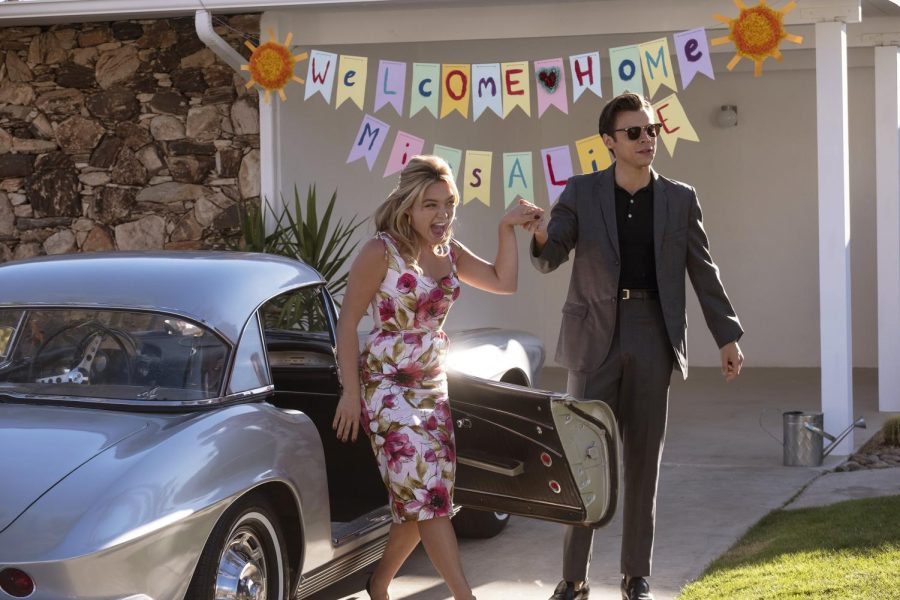Review | ‘Don’t Worry Darling’ — it was a movie
Warner Bros. Entertainment via AP
This image released by Warner Bros. Entertainment shows Florence Pugh, left, and Harry Styles in a scene from “Don’t Worry Darling.”
September 25, 2022
The problem with “Don’t Worry Darling” isn’t its actors or behind-the-scenes controversies, but its poor direction and lackluster finish.
Even with its beautiful cinematography, stellar soundtrack and a herculean effort from lead Florence Pugh, “Don’t Worry Darling” struggles to capitalize on what could have been a tremendous story.
The second film by director of the 2019 hit “Booksmart” Olivia Wilde offers viewers a psychological thriller focused on a young couple living an idyllic life in the closed-off desert community of Victory. Alice (Pugh) and Jack (Harry Styles) are the quintessential 1950s couple. By day, Jack goes to work with the other men in Victory at their mysterious headquarters. Meanwhile the women cook, clean, take rigorous ballet classes and shop. By night, the couple make love, party and laugh their cares away with friends. It is a decadent, Gatsby-esque life without want or care. There is only one rule 一 never leave the town.
Viewers of films like “Get Out,” “Suspiria” or “Midsommar” will recognize the film’s formula from the start 一 a seemingly peaceful place hiding a malicious secret. Likewise, all the usual lies, tricks and mind-bending visuals familiar to the genre are present. The location — a 1950s town flush with desert mountains, vintage cars, costumes and blinding green grass — is beautiful to behold. But it’s this air of constructed beauty that makes the setting likewise unsettling.
The town of Victory is supposed to be an oasis 一 a place of promise and prosperity. So says its founder, Frank (Chris Pine), who delivers a stellar, if undercooked, performance as the film’s central antagonist. Though he scarcely appears during the film’s 123-minute run-time, his presence stands out when in a scene.
But Frank, for all his promise, is never fully realized. Even toward the end of the film viewers will likely wonder what his overarching motivations were with little recompense. Regardless, Pine does an excellent job of breathing life into what he had to work with and should be lauded.
“Don’t Worry Darling” has no shortage of fine performances. Styles, known best as a world-renowned pop star, raises some eyebrows at first, but the singer’s acting chops are sound. His chemistry with Pugh is likewise wonderful. The couple is dazzling on the big screen and their interactions are believable and passionate.
Styles’ delivery suffers at times because of his fluctuating accent, but this seemed more an issue with direction than the actor himself 一 something the film as a whole struggles with. One minute, it seems like Jack is supposed to be American, only to be British halfway through. This is one of many examples where the film felt disjointed.
In fact, many of the reasons “Don’t Worry Darling” won’t transcend “fine” or “good” for the average viewer is its disconnected plot. Several times throughout its run, characters act a certain way because of an event which exists only to motivate them to the next plot point. This happens early in the film when Alice witnesses a plane crashing in the distant desert while on a bus in town.
Without spoiling too much, viewers will likely note that by the film’s end, the plane’s existence makes no sense. Action points like this spring up throughout the run and create loose threads which trip the narrative constantly.
This tripping becomes most apparent during the film’s second act, roughly halfway through, after Alice’s trip into the desert. What follows is an overlong sequence of loops, days played out in paranoia without substantial payoff — too many questions and not enough concrete answers.
Perhaps the main saving grace of the film is Pugh. The Academy Award-nominated actress delivers a tour-de-force performance as Alice and shines whenever she is on screen. Viewers will undoubtedly notice that many scenes are made or undone by Pugh’s delivery, which declines steadily toward the film’s conclusion. As Alice becomes tired and broken so too, it seems, did Pugh.
“Don’t Worry Darling” isn’t a bad movie 一 it also isn’t a great movie. For many viewers it will likely be something they forget entirely, not because it isn’t fun or visually-pleasing, but because it’s familiar. The main revelation is eye-rolling, unoriginal and relies far too heavily on common tropes of the genre. What remains is a film that ultimately takes almost no risks and is left with little reward.








